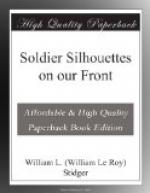“I haven’t had a letter in five months from home,” a boy in a hospital said to me. He was lonely and discouraged. And right here may I say to the American people that there is no one thing that needs more constant urging than the plea that you write, write, write to your soldier in France. He would rather have letters than candy, or cigarettes, or presents of any kind, as much as he loves some of these material things. I have put it to a vote dozens of times, and the result is always the same; ten to one they would rather have a letter from home than a package of cigarettes or a box of candy. I have seen boys literally suffering pangs that were a thousand times worse than wounds because they did not receive letters from those at home.
“Hell! Nobody back there cares a damn about me! I haven’t received a letter in five months!” a boy burst out in my presence in Nancy one night.
“Have you no mother or sister?”
“Yes, but they’re careless; they always were about letter-writing.”
I tried to fix up excuses for them, but it tested both my imagination and my enthusiasm to do it. I could put no real heart into making excuses for them, and so my words fell like lame birds to the ground, and the tragedy of it was that both of us knew there was no good excuse. It was the most pitiable case I saw in France. God pity the careless mother or sister or father or friend who isn’t willing to take the time and make the sacrifice that is needed to at least supply a letter three times a week to the lad who is willing to sacrifice his all, if need be, that those at home may live in peace, free from the horror of the Hun.
“Less Sweaters
And More Letters”
might very well be the motto of the folks here at home, for the boys would profit more in the long run, both in their bodies and in their souls. A censor friend of mine said to me one day: “If you ever get a chance when you go home to urge the people of America to write, and write, and write to their boys, do it with all your heart. You could do no better service to the boys than that.”
“What makes you feel so keenly about it?” I asked him, for he talked so earnestly that it surprised me. Ordinarily you think of the censor as utterly devoid of humanitarian impulses, just a sort of a machine to slice out the really interesting things in your letters, a great human blue pencil, or a great human pair of scissors. But here was a censor that felt deeply what he was saying.
“I’ll tell you,” he replied, “it is because some of the letters that I read which are going back home from lonely boys, begging somebody to write to them; literally begging somebody, anybody, to write! It gets my goat! I can’t stand it. I often feel like adding a sentence to some letters myself going home, telling them they ought to be ashamed the way they treat their boys about letter-writing; but the rules are so stringent that I must neither add to nor take from a letter save in the line of my duties. I’d like to tell a few of the people back home what I think of them, and I’d like for them to read some of the heartaches that I read in the letters of the boys. Then they’d understand how I feel about it.”




